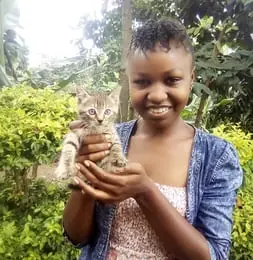
You have seen your cat lick itself as part of its grooming routine, and probably wonder what would happen if you licked it.
Maybe your cat is licking you and you would like to lick it back.
I will tell you all you need to know about licking your cat, why it’s unhygienic, and what to do if your cat licks you.
Keep reading to know why your cat might not appreciate you licking it and the health risks associated with the habit.
The answer to whether you should lick your cat:
It is wrong to lick your cat because:
- You can get sick from the dirt on its fur.
- Your tongue feels different.
- Huge amounts of swallowed fur can’t be digested.
- It’s unhygienic.
Stop your cat from licking your face by distracting it with toys or food, and using positive reinforcement.
Here are reasons why you should not lick your cat:
1. Licking Your Cat can Make You Seriously Sick
Getting close to our feline friends feels natural and fun. I am sure you like to kiss and cuddle your cat, perhaps even lick it. But, do you know there are certain lines to draw when bonding with your cat? Let’s see why licking your cat can make you sick.
When your cat licks itself, its tongue collects fleas, dirt, skin flakes, and fur. All these are swallowed and digested by its stomach acid.
That is why it is ok for your cat to lick its butt, its paws, and anything else that you consider filthy.
Therefore, if you lick your cat, and all this dirt ends up in your mouth, you can get seriously ill because obviously, you do not have the same kind of stomach acid as your cat, to digest all this.
There is also the risk of transmission of toxoplasma gondii parasite, which is transferred from fecal matter on your cat’s paws as it digs its litter to its body when it licks itself.
You have no idea the surfaces your cat rolls itself into, especially if it is an outdoor cat. This might include dried dog poop and dust.
2. Your Tongue is Different from Your Cat’s

Let’s understand why cats lick each other, to know why your tongue might not do the same job. Your cat may lick itself, or another cat as part of its grooming process, a gesture of affection or protection, and to clean each other in areas difficult to reach.
A mother cat licks her kittens to remove afterbirth fluids from their fur, and also to teach its kittens how to groom themselves.
Your cat licks itself for these reasons:
- To distribute natural skin oils.
- To eliminate parasites, allergies, or infections.
- To regulate body temperature.
- To cool itself down during summer.
Looking at the above reasons, it is clear why even if you lick your cat, you may not achieve the same purpose as your feline friend when it grooms itself.
Although both cats’ and humans’ tongues have papillae (taste buds), your cat’s papillae are longer and have far more keratin, thus the rough feeling. It plays a major role in helping your cat stay clean, and healthy.
Your tongue feels different, and so licking your cat will freak it out. Your saliva has proteins and chemicals different from your furry friend, therefore licking your cat will leave it confused.
Besides, it will mess up its fur since your tongue’s papillae can’t straighten out your cat’s fur.
Licking your cat will most probably annoy it, because you are replacing the scent it had already put when grooming itself.
3. Ingesting Cat hair is Dangerous
There are high chances of your cat’s hair ending up in your mouth if you lick it. You can catch harmful bacteria from your cat’s fur like Salmonella and E. coli.
Your body has a limited amount of digestive enzymes, so it will be impossible to digest huge amounts of your cat’s hair if you swallow it. That’s why it’s important to wash your hands after playing with your cat to minimize the risk of bacterial infection.
Don’t Let Your Cat Lick your Face

No matter how friendly you want to be with your cat, don’t let it lick your face, because of the health risks. Your cat’s saliva contains bacteria and parasites that can be transferred to your face.
If your cat has parasitic worms, it can pass these to you via licking and cause skin problems, or intestinal diseases.
Besides health risks, it is also unhygienic to let your cat lick your face. You do not know if it was licking its anus before licking your face. In that case, it could be transferring its feces to your face.
Your cat may have also eaten something that might be potentially harmful to you.
How To Stop Your Cat From Licking Your Face
1. Distractions
If your cat likes to sit beside you as you watch a movie, it probably might be tempted to start licking your face. You can distract it from doing so by keeping its toys close by.
Dangle your cat’s favorite toy near to its face to distract it from licking you. Even if you don’t have toys, you can still wave your hands, and keep your cat from getting so close to you.
Another great distraction is food. You can give your cat a tasty treat to distract it from licking you.
2. Positive reinforcement
Always reward your cat with a treat if it does not engage in undesirable behavior. If your cat can stay beside you without licking your face, give it a treat.
It will eventually understand that your face is a no-go zone. The reward will make it more likely to stop licking your face. Positive reinforcement is an effective way of shaping your pet’s behavior.
Licking For Affection, Marking Territory and Loneliness
Here are the reasons why your cat licks you:
1. To display affection
As a cat owner, you probably have experienced moments when your cat licks your arm or legs. Have you ever wondered what this means?
Well, we all assume that this is a sign of affection, which is quite true.
Cats lick each other to display affection, and it may be the same reason why your cat decides to lick you. It could be said that when you pet it, your feline friend returns the favor by licking you.
Kittens may lick you to relieve tension or anxiety; the same way we use hugs.
2. Acknowledging you as a family member
As funny as it may sound, your cat might view you as part of its family. That explains why your cat might bring you a dead mouse to share its meal, or even bring live prey in an attempt to teach you how to hunt.
When a cat licks you, it could be that it is teaching you how to groom yourself. Remember, this is a training that your furry friend also received from its mother when it was a kitten.
Let’s not forget that cats are also very attentive to our moods, and it might notice that you are stressed, thereby licks you to calm you down. It’s a friendly bonding behavior.
3. Marking territory
Your cat marks territory by using pheromones located on its facial area. Your pet licks you to claim you as part of their property affectionately. Consider it as an affirmation gesture that you are part of its tribe, and are important to it.
This explains why a strange cat will be reluctant to approach you because it can smell that you belong to another cat.
4. You taste good
If you have just eaten meat or fish, and your fingers still smell yummy, your cat could lick you. It’s a shame you were not kind enough to share a few bites with your furry friend.
Your cat may also lick you if you dropped food on your clothes and haven’t yet noticed.
5. It’s a survival strategy
Your cat’s relatives in the wild are used to grooming after eating to get rid of any evidence of food. This is a survival strategy to keep off predators.
It could be that your cat is licking food from you to eliminate food evidence and help you keep off enemies.
6. Your cat is lonely
If you own more than one cat, you may already have noticed that grooming is part of their common social activity. It is how they bond with each other.
Perhaps you spend a lot of time away from home, so your cat friend licks you to show that it is lonely and needs more bonding time. You may want to respond by petting your cat, brushing it, or scratch it below its chin; it’s a favorite spot.
Give your cat attention, and the constant licking might reduce.

Sources
https://www.theatlantic.com/science/archive/2019/07/does-my-cat-want-me-lick-her-back/594988/
https://www.petmd.com/cat/general-health/cool-facts-about-your-cats-tongue
